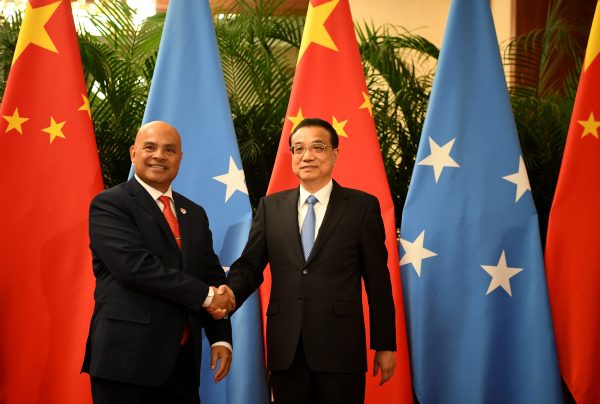The FSM is a Freely Associated State of the United States in the North Pacific. The United States provides defence, funding grants and access to US social services for Micronesian citizens under the Compact of Free Association (COFA) signed in 1986.
Signatories of the COFA receive such benefits in exchange for US control over the airspace and waters of these nations. The visit therefore provides a lens through which to observe China’s influence in the Pacific Islands amid growing geopolitical competition between China and the United States.
Some achievements of the recent visit include a visa waiver for passport holders from the two countries, agreement on the renovation of the Pohnpei state government complex with US$10 million worth of Chinese aid, a grant of US$12 million to the FSM for economic cooperation and a US$2 million donation to the FSM Trust Fund.
Much of China’s influence derives from its development assistance to the FSM. A main reason for Panuelo’s visit was to seek additional Chinese infrastructure assistance. Chinese aid to the FSM amounts to more than US$100 million over the past three decades.
China-funded infrastructure projects across the FSM’s four island states include the Chuuk State government complex, the Kahmar bridge and the FSM–China friendship sports centre. China donated one China-made Y-12 aircraft to the FSM and one passenger-cargo ship to both Yap and Chuuk states respectively. Chinese aid also comes in the form of capacity building through demonstration farms used to exhibit agricultural techniques.
In contrast to other Pacific island countries such as Tonga and Vanuatu, both of which have borrowed large concessional loans from China, the FSM avoids debt risk by only taking Chinese aid grants thanks to its policy of not taking loans.
The FSM is appealing to China in at least three ways. First, the FSM is one of only two North Pacific island countries that recognise China over Taiwan. Second, Chinese companies have been exploring economic opportunities in the FSM, with fisheries being their main focus. The federation spreads over 7.4 million square kilometres and is endowed with rich fisheries despite its small population of 105,000 people. Third, the FSM is situated along the second island chain next door to US military facilities in Guam and the Marshall Islands which gives it significant military and strategic value.
The accelerated military modernisation of the People’s Liberation Army means that the second island chain could receive more Chinese attention in the future, especially if the China–US strategic rivalry increases drastically. But since the Compact of Free Association grants the US exclusive military access to the FSM, it is unlikely that China will establish a military foothold in the country.
There are limits to China’s influence in the FSM and the North Pacific. First, China faces strong competition from traditional powers such as the United States. US Secretary of State Mike Pompeo visited the FSM for the first time in August 2019 and pushed for the renegotiation of the Compact of Free Association with the FSM, Palau and Marshall Islands. The COFA denies any third party use of the islands for military purposes.
Second, Taiwan maintains a strong influence in the North Pacific. Three of its four diplomatic partners in the Pacific Islands are from the region. The governments of Palau, the Marshall Islands and Nauru have made it clear that they will stick with Taiwan.
Third, China is viewed with suspicion by some Micronesian citizens who claim that China is moving in on a territory traditionally controlled by the United States.
A fourth constraint is that China’s economic slowdown could affect its foreign aid budget. Its government-to-government approach also limits its engagement with other stakeholders in the FSM and Pacific Island countries, especially at the grassroots level. China’s Belt and Road Initiative is not well understood by the FSM population for this reason.
The FSM government is actively exploring different international avenues to achieve its economic objectives and lessen dependency on COFA funds provided by the United States. The inflow of Chinese aid fits with this endeavour.
The China factor could play a large role in current US–FSM Compact negotiations and increase FSM’s leverage, though the FSM government is carefully balancing its relations with the United States and China.
Questions about the FSM in the context of US–China rivalry are related to the old issue of superpower rivalry over the FSM since colonisation. They raise the question of whether or not Micronesians are passive bystanders or active participants in the decision-making processes that affect their own interests in this geopolitical equation.
Chuuk State, the most populous area of the FSM, recently postponed its scheduled independence referendum from March 2020 to 2022. The move gives more time for negotiations between Chuuk and the FSM federal government.
Though a future solution is unclear, what is more certain is that US–China rivalry will feature in the negotiations. There has already been speculation that an independent Chuuk may turn to China and compromise Washington’s strategic dominance in the North Pacific. Taking into account the limits of China’s influence in the North Pacific, this deserves attention.
Denghua Zhang is a Research Fellow at the Coral Bell School of Asia Pacific Affairs, The Australian National University.
Gonzaga Puas is a senior researcher at the Micronesian Institute for Research and Development (MIRAD), Pohnpei, and a researcher at the College of Asia and the Pacific, The Australian National University.

